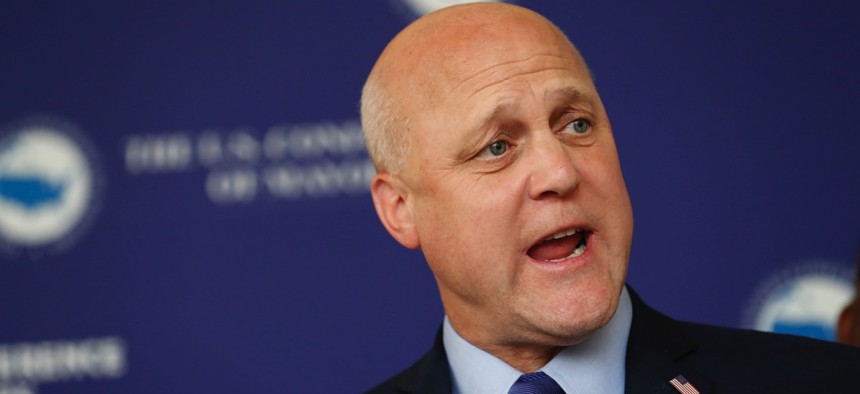Finding the ‘Secret Sauce’ for City Innovation

New Orleans Mayor Mitch Landrieu Alex Brandon / AP Photo

Connecting state and local government leaders
With Bloomberg Philanthropies funding, Harvard University is bringing mayors together to teach them how to bring about change—and will research what makes that change possible in the first place.
A new Bloomberg Philanthropies-Harvard University partnership intended to educate mayors and members of their senior staffs on how to sustainably innovate their municipal operations officially launched Thursday. The Bloomberg Harvard City Leadership Initiative will offer executive training sessions through the Ash Center for Democratic Governance and Innovation at Harvard's Kennedy School of Government and will feature a customized curriculum taught by university professors through in-person and virtual courses.
The initiative seeks to establish student fellowships in mayoral offices, research the conditions necessary for continuous municipal innovation and have newly elected mayors mentored by city hall veterans, like New Orleans Mayor Mitch Landrieu.
“Our city right now, because of the catastrophic events we’ve experienced, has gone from being a declining city to being ascendent,” Landrieu told Route Fifty in an interview on Thursday. “We’ve possibly become the country’s most immediate laboratory for innovation and change.”
Former New York City Mayor Michael Bloomberg, whose Bloomberg Philanthropies is fronting $32 million to enroll 300 mayors and 400 aides in the next four years, mentored Landrieu when he assumed office in 2010.
Ravaged by Hurricane Katrina in 2005, the beleaguered New Orleans city government had to reorganize in the disaster's aftermath, Landrieu said. And that required learning from other municipalities.
As U.S. cities continue to grow, mayors are being forced to address the challenges of immigration, transportation and public safety that the federal government is often reluctant to touch, he said.
“Behind all those policy challenges is a bigger capacity challenge to diagnose problems carefully and identify and develop the best possible solutions,” said Jorrit de Jong of the Kennedy School, who will serve as the initiative's faculty director. “It’s that diagnostic work that’s hard to find time for.”
Teaching mayors and their advisers innovative management techniques hasn’t been done on this scale and will deepen the capacity for change in city halls.
That intellectual capital can be leveraged to change how city government operates and deepen national appreciation for mayors, Landrieu said. He predicts a cascade effect where quick problem-solving by municipalities will see citizens come to expect it, and the federal government will be compelled to improve its efficiency.
Data analytics and cross-silo sharing, participatory governance where citizens are engaged and performance management are just a few approaches de Jong said he wants to focus on with mayors.
Sessions will largely be discussion based and their impact monitored as part of the initiative's effort to better understand the nuts and bolts of municipal innovation.
“Where the literature is largely lacking is this notion of how do you build an innovative jurisdiction,” de Jong said. “How do you come up with an organization that repeatedly and reliably comes up with better solutions?”
The initiative’s mentorship program hasn’t been designed yet, but de Jong said he envisions identifying former mayors who’ve been extremely successful at innovating and asking them to serve.
"[D]espite the importance of the role, mayors often lack opportunities to learn from experts—and one another,” Bloomberg said in Thursday's announcement. “By giving mayors tools and resources—and by connecting them with peers facing many of the same challenges—this program will go a long way toward helping them run cities more effectively."
PREVIOUSLY on Route Fifty:
Dave Nyczepir is a News Editor at Government Executive’s Route Fifty and is based in Washington D.C.

NEXT STORY: Voter Information on Government Websites Still Fails Basic Accessibility Tests





